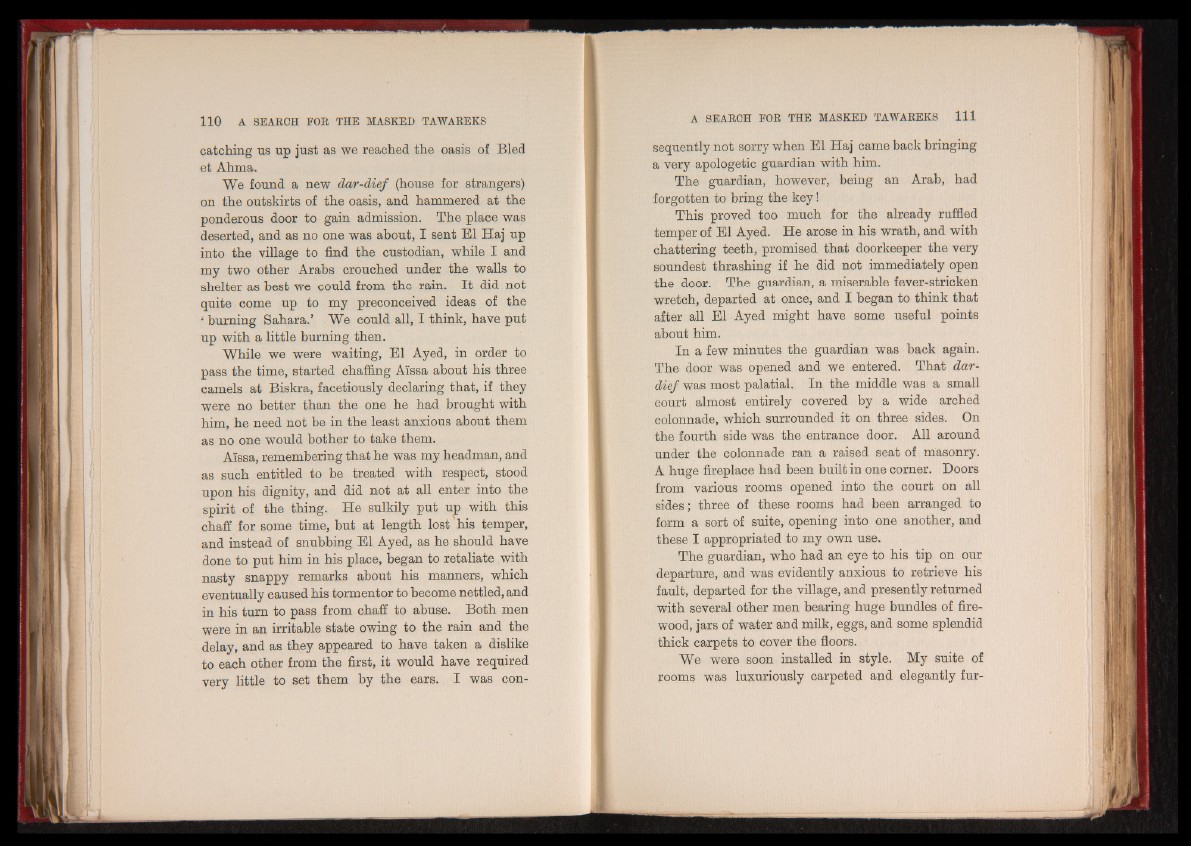
catching us up just as we reached the oasis of Bled
et Ahma.
We found a new dar-dief (house for strangers)
on the outskirts of the oasis, and hammered at the
ponderous door to gain admission. The place was
deserted, and as no one was about, I sent El Haj up
into the village to find the custodian, while I and
my two other Arabs crouched under the walls to
shelter as best we could from the rain. It did not
quite come up to my preconceived ideas of the
* burning Sahara.’ We could all, I think, have put
up with a little burning then.
While we were waiting, El Ayed, in order to
pass the time, started chaffing Aissa about his three
camels at Biskra, facetiously declaring that, if they
were no better than the one he had brought with
him, he need not be in the least anxious about them
as no one would bother to take them.
Aissa, remembering that he was my headman, and
as such entitled to be treated with respect, stood
upon his dignity, and did not at all enter into the
spirit of the thing. He sulkily put up with this
chaff for some time, but at length lost his temper,
and instead of snubbing El Ayed, as he should have
done to put him in his place, began to retaliate with
nasty snappy remarks about his manners, which
eventually caused his tormentor to become nettled, and
in his turn to pass from chaff to abuse. Both men
were in an irritable state owing to the rain and the
delay, and as they appeared to have taken a dislike
to each other from the first, it would have required
very little to set them by the ears. I was consequently
not sorry when El Haj came back bringing
a very apologetic guardian with him.
The guardian, however, being an Arab, had
forgotten to bring the key!
This proved too much for the already ruffled
temper of El Ayed. He arose in his wrath, and with
chattering teeth, promised that doorkeeper the very
soundest thrashing if he did not immediately open
the door. The guardian, a miserable fever-stricken
wretch, departed at once, and I began to think that
after all El Ayed might have some useful points
about him.
In a few minutes the guardian was back again.
The door was opened and we entered. That dar-
dief was most palatial. In the middle was a small
court almost entirely covered by a wide arched
colonnade, which surrounded it on three sides. On
the fourth side was the entrance door. All around
under the colonnade ran a raised seat of masonry.
A huge fireplace had been built in one corner. Doors
from various rooms opened into the court on all
sides; three of these rooms had been arranged to
form a sort of suite, opening into one another, and
these I appropriated to my own use.
The guardian, who had an eye to his tip on our
departure, and was evidently anxious to retrieve his
fault, departed for the village, and presently returned
with several other men bearing huge bundles of firewood,
jars of water and milk, eggs, and some splendid
thick carpets to cover the floors.
We were soon installed in style. My suite of
rooms was luxuriously carpeted and elegantly fur